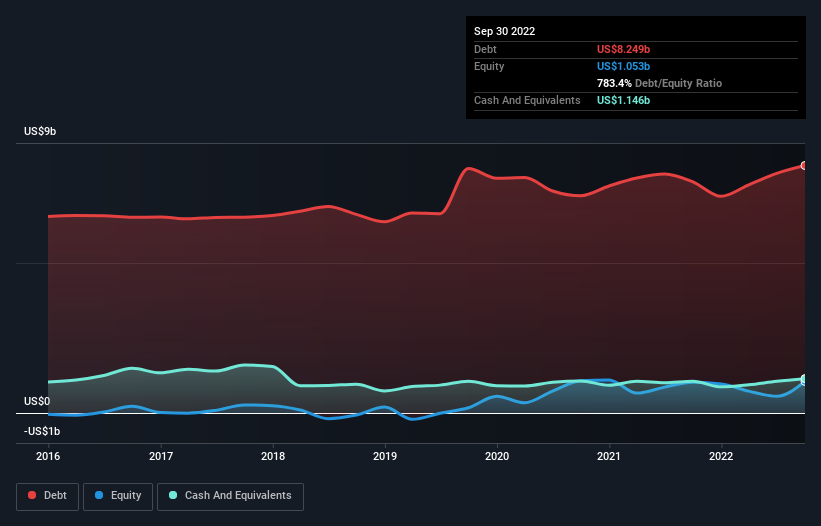- United States
- /
- Household Products
- /
- NYSE:CL
Does Colgate-Palmolive (NYSE:CL) Have A Healthy Balance Sheet?

David Iben put it well when he said, 'Volatility is not a risk we care about. What we care about is avoiding the permanent loss of capital.' So it might be obvious that you need to consider debt, when you think about how risky any given stock is, because too much debt can sink a company. We can see that Colgate-Palmolive Company (NYSE:CL) does use debt in its business. But should shareholders be worried about its use of debt?
What Risk Does Debt Bring?
Debt assists a business until the business has trouble paying it off, either with new capital or with free cash flow. In the worst case scenario, a company can go bankrupt if it cannot pay its creditors. While that is not too common, we often do see indebted companies permanently diluting shareholders because lenders force them to raise capital at a distressed price. Of course, plenty of companies use debt to fund growth, without any negative consequences. When we examine debt levels, we first consider both cash and debt levels, together.
Check out our latest analysis for Colgate-Palmolive
What Is Colgate-Palmolive's Net Debt?
As you can see below, at the end of September 2022, Colgate-Palmolive had US$8.25b of debt, up from US$7.71b a year ago. Click the image for more detail. However, it does have US$1.15b in cash offsetting this, leading to net debt of about US$7.10b.

How Strong Is Colgate-Palmolive's Balance Sheet?
The latest balance sheet data shows that Colgate-Palmolive had liabilities of US$4.49b due within a year, and liabilities of US$10.7b falling due after that. Offsetting these obligations, it had cash of US$1.15b as well as receivables valued at US$1.43b due within 12 months. So its liabilities total US$12.7b more than the combination of its cash and short-term receivables.
While this might seem like a lot, it is not so bad since Colgate-Palmolive has a huge market capitalization of US$62.9b, and so it could probably strengthen its balance sheet by raising capital if it needed to. But we definitely want to keep our eyes open to indications that its debt is bringing too much risk.
We measure a company's debt load relative to its earnings power by looking at its net debt divided by its earnings before interest, tax, depreciation, and amortization (EBITDA) and by calculating how easily its earnings before interest and tax (EBIT) cover its interest expense (interest cover). Thus we consider debt relative to earnings both with and without depreciation and amortization expenses.
Colgate-Palmolive's net debt to EBITDA ratio of about 1.7 suggests only moderate use of debt. And its commanding EBIT of 18.4 times its interest expense, implies the debt load is as light as a peacock feather. Sadly, Colgate-Palmolive's EBIT actually dropped 6.5% in the last year. If earnings continue on that decline then managing that debt will be difficult like delivering hot soup on a unicycle. The balance sheet is clearly the area to focus on when you are analysing debt. But ultimately the future profitability of the business will decide if Colgate-Palmolive can strengthen its balance sheet over time. So if you're focused on the future you can check out this free report showing analyst profit forecasts.
Finally, a company can only pay off debt with cold hard cash, not accounting profits. So the logical step is to look at the proportion of that EBIT that is matched by actual free cash flow. During the last three years, Colgate-Palmolive produced sturdy free cash flow equating to 74% of its EBIT, about what we'd expect. This free cash flow puts the company in a good position to pay down debt, when appropriate.
Our View
Happily, Colgate-Palmolive's impressive interest cover implies it has the upper hand on its debt. But, on a more sombre note, we are a little concerned by its EBIT growth rate. All these things considered, it appears that Colgate-Palmolive can comfortably handle its current debt levels. Of course, while this leverage can enhance returns on equity, it does bring more risk, so it's worth keeping an eye on this one. When analysing debt levels, the balance sheet is the obvious place to start. However, not all investment risk resides within the balance sheet - far from it. For example, we've discovered 1 warning sign for Colgate-Palmolive that you should be aware of before investing here.
Of course, if you're the type of investor who prefers buying stocks without the burden of debt, then don't hesitate to discover our exclusive list of net cash growth stocks, today.
New: AI Stock Screener & Alerts
Our new AI Stock Screener scans the market every day to uncover opportunities.
• Dividend Powerhouses (3%+ Yield)
• Undervalued Small Caps with Insider Buying
• High growth Tech and AI Companies
Or build your own from over 50 metrics.
Have feedback on this article? Concerned about the content? Get in touch with us directly. Alternatively, email editorial-team (at) simplywallst.com.
This article by Simply Wall St is general in nature. We provide commentary based on historical data and analyst forecasts only using an unbiased methodology and our articles are not intended to be financial advice. It does not constitute a recommendation to buy or sell any stock, and does not take account of your objectives, or your financial situation. We aim to bring you long-term focused analysis driven by fundamental data. Note that our analysis may not factor in the latest price-sensitive company announcements or qualitative material. Simply Wall St has no position in any stocks mentioned.
About NYSE:CL
Colgate-Palmolive
Manufactures and sells consumer products in the United States and internationally.
Established dividend payer and good value.
Similar Companies
Market Insights
Community Narratives



